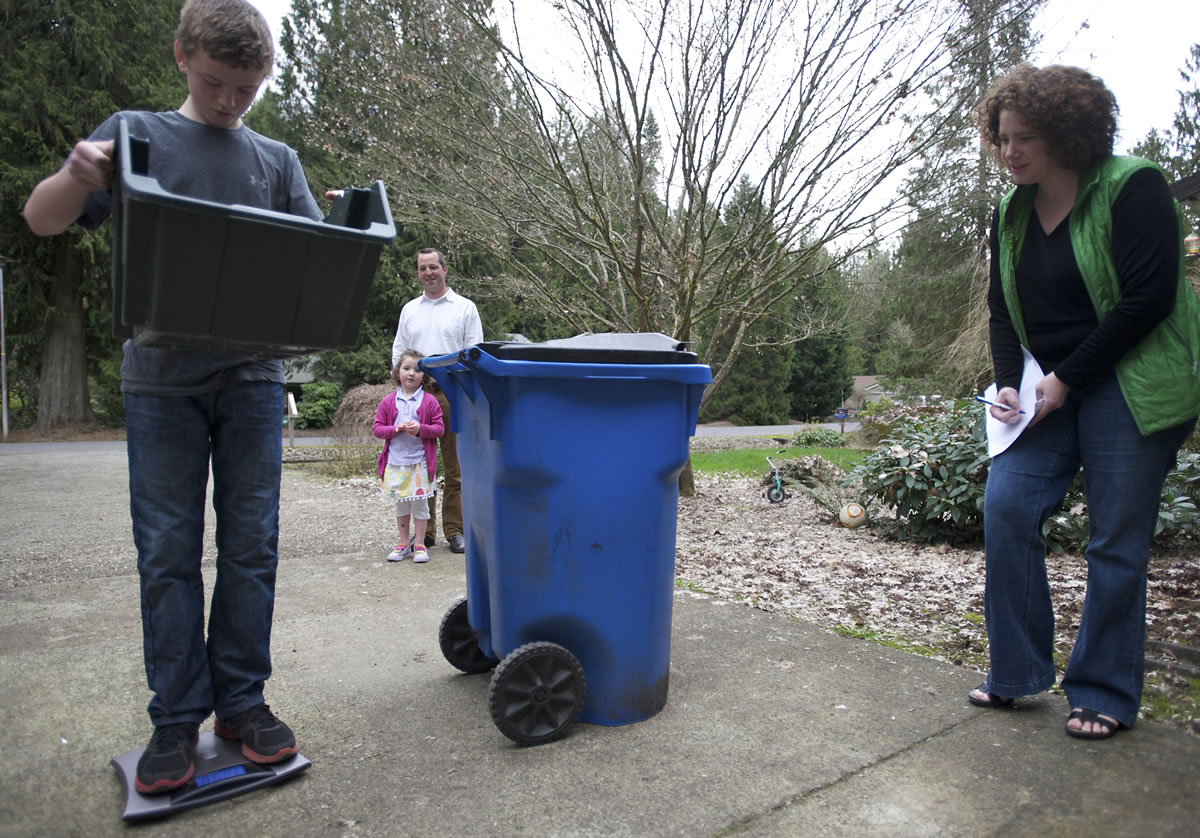• Stop junk mail. Learn more here.
• Buy in bulk and bring your own containers to save on packaging.
• Ditch single-use items including plastic bags and plastic water bottles. Opt for durable, reusable items instead.
• Start composting. Learn more here.
• Donate things you don’t use anymore so others can use them.
Find out how to properly dispose of a variety of materials in Clark County at Recycling A-Z.
Earlier this month, five Clark County families embarked on a five-week journey designed to change the way they think about their household waste, and change their behavior to reduce it.
• Stop junk mail. Learn more here.
• Buy in bulk and bring your own containers to save on packaging.
• Ditch single-use items including plastic bags and plastic water bottles. Opt for durable, reusable items instead.
• Start composting. Learn more here.
• Donate things you don't use anymore so others can use them.
Turns out, just signing up for the Wastebusters challenge may have done the trick.
“Anticipating this, I was surprised how quickly your mind-set can change,” said Vancouver resident Suzanne Mickelson. “That has been the most immediate brain switch.”
Mickelson found herself jotting down ideas for how to cut down her family’s trash output. She started using wash rags, ditching the disposable paper towels she said she used “way too many of.” She considered the amount of packaging around everything she buys, even a tube of toothpaste.
“It really makes you think,” Mickelson said. “And of course, it makes you feel guilty. But it’s a good guilt.”
The Wastebusters program, now in its second year in Clark County, pits five families against each other in a friendly waste-reduction competition. Each participating household conducted a trash audit and an initial weigh-in to establish its starting point. The family that cuts down its waste the most is crowned top wastebuster at the end of the five weeks. Participants will also take on more specific challenges along the way.
One of the benefits of the program is taking families out of their comfort zone, said Serena Calder, an AmeriCorps volunteer coordinating Wastebusters as the county’s sustainability educator this year. That means more than simply filling the recycle bin, she said. It means finding ways to not produce that waste in the first place.
“Recycling is really important and recycling is really great,” Calder said. “But there’s a lot of things you can do beyond recycling.”
Plenty of factors influence what ends up in a family’s trash can — kids, pets, even the neighborhood it calls home. For the Loudenback family in the Brush Prairie area, rural life means being more deliberate about the trips they make into town.
That tends to cut down on conveniences such as fast food and the packaging that comes with it, said Amy Loudenback. The family of five doesn’t eat much take-out, she said, and plans ahead for most meals.
“You can’t just run to the store every time you want something,” Loudenback said.
Loudenback and her family already have other waste-reduction steps in mind. They’re using cotton hankies instead of tissues. Amy Loudenback said she plans to make her own reusable bulk food bags to avoid using plastic.
The Mickelson family lives in east Vancouver’s Riveridge neighborhood. A more urban setting with urban services can be a blessing or a curse when it comes to cutting down on waste, Suzanne Mickelson said.
“The trash and recycling systems are so good that it almost makes it too easy for people to throw things in the garbage, or be an over-recycler,” she said.
The Loudenbacks — Amy, husband Robert, three kids and a cat — checked in with a base weight of 29 pounds of waste. That’s 100 percent of their trash in a week, plus 15 percent of their recycling. The Mickelsons’ starting point is just under 37 pounds, generated by three adults, a toddler, a dog and two cats. Other families’ totals ranged from 14.36 pounds to 78.8 pounds. They all used county-issued scales to weigh their trash and recycling.
The final weigh-in will happen April 14. A Wastebusters recognition ceremony is set for April 20, to coincide with an Earth Day fair the same day.
Eric Florip: 360-735-4541; http://twitter.com/col_enviro; eric.florip@columbian.com




